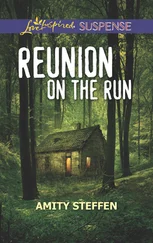“What?” I said. “OK.”
I turned in a circle, trying to remember where we were.
“We’re in Boston,” I said.
“I’m fine I’m fine I’m fine.”
This time, the words left her spent, hanging slightly forward.
“You are fine,” I said. “Of course you’re fine.”
I turned on the lamp by her bedside.
“No.” She squinted. “Turn it off, Daddy. Too bright.”
“You’re right,” I said, obeying, leaving us again in the flickering darkness. “I bet you, if we sit here, and I tell you a long, interesting story, you’ll be able to breathe normally and fall right back to sleep. All right? Scoot over. And sit up straight. That always helps you breathe, doesn’t it? To sit up?”
She mustered a smile, and I fluffed the pillows all around her.
Dear God, I thought. Not this.
“My story,” I said, “is called ‘The Camel of Boston Common.’ ”
I waited. I could hear her rasp in the darkness. Stay calm, I told myself. Staying calm would be my only important function. Her affliction — can I call it that? — was something that had manifested itself when she was about four, somewhere during the final act of her parents’ marriage, and perhaps for this reason, I never thought of her asthma as entirely physical. I mean, I related to it metaphorically, the threat of spiritual suffocation. Which is not to say I ignored medical solutions. I’d been there when the treatments were prescribed — a small albuterol inhaler to which she immediately affixed glittery stickers. Not a serious case, the pediatrician had said. Could be a lot worse. But she should keep this with her at all times .
“Once upon a time, there was a camel who got lost in Boston. He — uh — he had never been to Boston before, so he did not know that the people of Boston are prejudiced against camels. In fact, there was a shoot-to-kill order on camels — an obscure law that camel activists had tried to repeal but kept falling short of the votes they needed given the cronyism and general anti-camel sentiment in Faneuil Hall. How are you doing?”
With a wheezy inhalation, she nodded.
“OK? Great. OK. So this camel — his name was Alal — had gotten bizarrely, totally lost in Boston, separated from his, what, his herd . But everywhere he went, people were so rude to him, calling him Humpback and Goat-Hoof, and nobody would tell him which way to the Sahara. Somewhere around the corner of Boylston and Arlington he spied a nice little patch of grass. This was, as everybody knows, Boston Common.”
“Daddy?”
“Yes, Butterscotch.”
“Can I have my inhaler?”
I swallowed the stone in my throat. “As you may remember,” I said, “your inhaler is in your backpack. Which is in Vermont.”
She turned her head toward me, her cheek pressed against her hand, and sighed like a very old soul.
“We can get you a new inhaler, of course. But we can’t get a new one right now. I mean, it’s three o’clock in the morning. We’ll find a pharmacy first thing in the morning.”
She stared at me in the flickering light. Her gaze, somewhat vacant and dry, gave me pause.
“Don’t be scared,” I said.
She nodded.
“Don’t be scared. That makes it worse.”
“It feels like — someone is — tying—”
“Tying—”
“—tyingmythroatupwithstring.”
“Oh, Meadow, I wouldn’t let anyone do that. OK? Don’t let yourself imagine that.” I sat upright. “I know just what’ll help.”
I went into the bathroom and turned on the shower spigots, calling out toward the bedroom, “I used to have trouble breathing when I was a boy, too. Did I ever tell you that? This was back in East Germany. We didn’t have very advanced medicine back then. We didn’t have inhalers. Things got bad enough, they’d take you to the hospital and intubate you.” I came out of the bathroom, peeled back the bedspread, and gently scooped her up. “So of course, my mother tried to find home remedies. Eucalyptus. Prayers to the Moon God, what have you. But the only thing that seemed to help”—I placed Meadow on the cold tiles of the bathroom—“was a nice hot steam shower.”
She was an absurdly colored bird in the steam. I helped her off with her little jacket, and then she stepped out of the collapsed dress. She stood trembling in her underpants, not even bothering to cover her chest. I could see the strain of her ribs under her skin.
“If this doesn’t help, I’ll take you straight to the hospital.”
She inhaled. “Idon’twanttogotothehospital.”
“Boy oh boy. Let me tell you, neither do I. So let’s stay positive. Upsie-daisy.”
I lifted her into the bathtub and she stood in the basin with her hands drawn up under her chin. Her eyeglasses instantly fogged. I reached in to remove them from her face, and as I did so, I grew slightly dizzy myself, remembering those distant treatments.
“You inhale the steam,” I said, “and I’ll just sit right here on the toilet. Very dignified.”
She said nothing. I closed the plastic curtain and sat beside the bathtub on the cold toilet lid. The shower curtain billowed out of the basin. From its tattered hem water was pouring brokenly. A dirty tributary pushed across the tiles toward the door. I could hear the sound of water upon my daughter’s skull.
We’d done everything the doctor said. She had a couple minor attacks, so we bought a HEPA filter and gave away the mouse and didn’t feed her gluten, and then we got divorced. I could still remember those and other emergencies as clearly as if they had just occurred: a bad burn once when she tried to fry some Play-Doh, the time she ingested a Christmas rose at her grandmother’s and we wept all the way to the hospital, several horrible fevers, in which we experienced ghoulish waking visions throughout the night vigil as if we had, according to our prayers, changed places with her. In a bygone era, we would have lost her ten times over. And yet we never did. We never did. Whatever force took her to that edge always brought her back to us.
“Butterscotch?”
“Yes?”
“Does the steam seem to be helping?”
“Yeah.”
“Good.”
“But—”
“But what.”
“I feel spinnish.”
“You want a chair in there? Something to sit on?”
“Yeah.”
Spinnish, I thought, stepping out into the room. This cannot be good. I had come to rely — I see this now — on that bracing shot of the inhaler, and had forgotten — had I ever truly learned it — the true nature of her illness, what was physically happening to her, what should be done about it. I believed — I remembered — that steam showers had helped me when I was sick as a child, but sick with what? Pertussis? I had grown out of my case. Dorchester had cured me of it, whatever it was. I had grown out of it, or it had been bullied out of me, and so I kept expecting her to grow out of it, but look, she hadn’t, and the truth is I really didn’t know what the hell to do.
That’s when I heard the thud in the bathroom.
The rings screamed against the rod as I pushed the curtain aside. She was on her belly in the basin, under the deluge of water, her hair slicked down over her back and face and darkened by water. She turned her head to me slowly, dawningly, her under-eyes bruised.
“All righty,” I said. “Off we go.”
“Where?”
“For help.”
“No,” she rasped.
“We’re going,” I said, taking hold of her slippery arm.
“No!”
“We are going! We are going! Stand up .”
“No!” She yanked her arm back.
“Stand up, God damn you !”
I turned off the spigot, wrapped her in a towel to get a grip on her, and took her back into the bedroom. She struggled meekly, nakedly, her underwear soaked through.
Читать дальше












